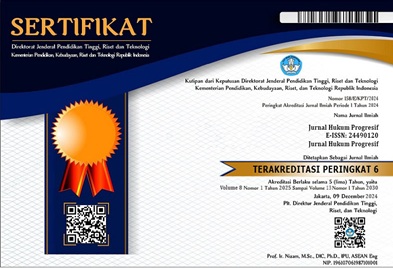ANALISIS YURIDIS PERTIMBANGAN HAKIM DAN IMPLIKASI HUKUM TERHADAP KEDUDUKAN ANAK DALAM PEMBAGIAN HARTA PERKAWINAN PASANGAN BEDA AGAMA: STUDI KASUS PUTUSAN NOMOR 4/PDT.P/2013/PA.BDG
Kata Kunci:
Pertimbangan Hakim, Sengketa Waris, Kedudukan HukumAbstrak
Perkawinan beda agama merupakan persoalan kompleks dalam sistem hukum Indonesia yang menganut prinsip bahwa perkawinan sah apabila dilakukan menurut hukum masing-masing agama dan kepercayaannya. Penelitian ini bertujuan untuk mengkaji kedudukan anak dan pembagian harta bersama dalam konteks perceraian pasangan beda agama, dengan studi kasus Putusan Nomor 4/Pdt.P/2013/PA.Bdg. Metode yang digunakan adalah penelitian hukum kualitatif dengan pendekatan yuridis normatif dan yuridis sosiologis. Data diperoleh melalui studi pustaka terhadap peraturan perundang-undangan, yurisprudensi, dan analisis putusan pengadilan. Undang-Undang Nomor 1 Tahun 1974 tidak secara tegas mengatur keabsahan perkawinan beda agama. Namun, melalui beberapa putusan Mahkamah Agung dan Mahkamah Konstitusi, terdapat ruang terbatas untuk pengakuan hukum terhadap praktik ini. Dalam kasus perceraian, Pengadilan Agama tetap berwenang memeriksa apabila salah satu pihak beragama Islam. Hakim membagi harta bersama secara proporsional dan menentukan hak asuh anak dengan mempertimbangkan prinsip kepentingan terbaik bagi anak. Kasus ini mencerminkan kenyataan bahwa perkawinan beda agama tetap terjadi dalam masyarakat, meskipun dihadapkan pada hambatan hukum dan sosial. Secara filosofis, hal ini menimbulkan perdebatan mengenai keadilan substantif, perlindungan anak, dan penghormatan terhadap hak asasi manusia. Penelitian ini merekomendasikan reformulasi norma hukum perkawinan agar lebih inklusif terhadap keberagaman agama serta menjamin perlindungan hukum bagi anak dalam konteks perkawinan beda agama.
: Interfaith marriage is a complex issue in the Indonesian legal system that adheres to the principle that a marriage is valid if it is carried out according to the laws of each religion and its beliefs. This study aims to examine the status of children and the division of joint property in the context of divorce of interfaith couples, with a case study of Decision Number 4/Pdt.P/2013/PA.Bdg. The method used is qualitative legal research with a normative legal and sociological legal approach. Data were obtained through a literature study of regulations, jurisprudence, and analysis of court decisions. Law Number 1 of 1974 does not explicitly regulate the validity of interfaith marriage. However, through several decisions of the Supreme Court and the Constitutional Court, there is limited room for legal recognition of this practice. In divorce cases, the Religious Court still has the authority to examine if one of the parties is Muslim. The judge divides joint property proportionally and determines child custody by considering the principle of the best interests of the child. This case reflects the reality that interfaith marriages continue to occur in society, despite legal and social obstacles. Philosophically, this raises issues of substantive justice, child protection, and respect for human rights. This study recommends reformulating marriage legal norms to be more inclusive of religious diversity and to guarantee legal protection for children in the context of interfaith marriages.





